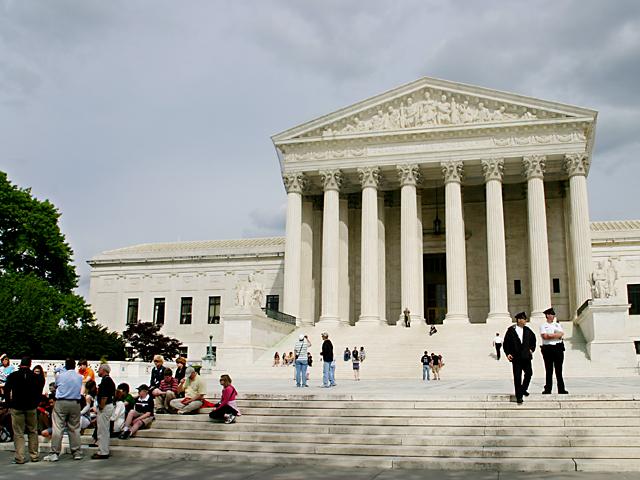8 States Join RFS Fight at SCOTUS
States Make Case Small-Refinery Exemptions Hurt Their Economies
LINCOLN, Neb. (DTN) -- EPA granting small-refinery exemptions -- 88 since 2016 -- guts the Renewable Fuel Standard and harms state economies, eight states alleged in amicus briefs filed on Wednesday in a Renewable Fuel Standard Supreme Court case set for arguments on April 27.
Several biofuel and agriculture groups also filed briefs with the court on Wednesday, lining up to urge the Supreme Court to uphold a ruling by the U.S. Court of Appeals for the 10th Circuit in Denver in January 2020.
The 10th Circuit ruled in HollyFrontier v. Renewable Fuels Association that the EPA had illegally granted small-refinery exemptions to three refiners in 2017 and 2018 (https://www.dtnpf.com/…).
At the beginning of March, seven states and refiners argued the 10th Circuit's ruling was incorrect (https://www.dtnpf.com/…).
On Wednesday, the states of Iowa, Nebraska, Illinois, Michigan, South Dakota, Minnesota, Oregon and Virginia said small-refinery exemptions have hurt their states and the biofuel industries in their states.
"The expansive interpretation of the small-refinery exemption advanced by petitioners has the practical effect of cutting the renewable fuel mandates significantly below the levels required by statute," the states argued.
"This guts the RFS, rendering it ineffective in creating demand for renewable fuel. And without the demand created by the RFS, the renewable fuel industry will continue to suffer substantial economic harm. This harm is not hypothetical. Over the past few years, we have seen the direct effects of the EPA's unfettered granting of small-refinery exemptions."
From 2016 to 2018, the states said, exemptions reduced the RFS mandate by an average of 7% each year, causing more than $2 billion in lost demand for renewable fuel each year.
"Renewable fuel plants have been slowed, idled, and shuttered," they said.
P[L1] D[0x0] M[300x250] OOP[F] ADUNIT[] T[]
"And if the gates are thrown open for all small refineries to be granted exemptions anew -- even though they have previously complied with the RFS -- the reduction could be even more drastic. Because the renewable fuel industry anchors many rural economies, the harms inflicted by reversing the 10th Circuit's decision would ripple out to devastating effect on rural communities and states."
The states said dialing back on the RFS also harms the environment and energy independence.
In Iowa, the brief said, the renewable fuel industry accounted for about $4 billion, or 2% of the state's gross domestic product in 2020. From 2010 to 2017 in Nebraska, the biofuels industry contributed from 3,500 to 4,900 jobs each year.
Nebraska also depends on the renewable fuel industry to grow rural jobs. From 2010 to 2017, the industry directly contributed between 3,508 to 4,900 Nebraska jobs each year with a total income generated of $255 million to $325 million per year.
"Biodiesel is also a significant component of the renewable fuel economy," the states said. "For example, in 2016, Minnesota produced 74 million gallons of biodiesel alone, which is associated with $1.7 billion in total output impact and 5,397 jobs."
In 2020, the U.S. industry had an estimated $34.7 billion effect on the GDP, the brief said.
Refining interests argued in their brief to the Supreme Court if the 10th Circuit decision is upheld, small refineries likely would be unable to qualify for exemptions going forward (https://www.dtnpf.com/…).
Growth Energy and the American Farm Bureau Federation filed an amicus brief on Wednesday in which they argued small-refinery exemptions are meant to be rare.
"If EPA had applied the lower court's statutory interpretation -- that a refinery is eligible for an exemption extension for a given year only if it was exempt for the prior year -- then no more than two refineries could have received exemption extensions after 2015," the two groups said, "and the extensions' effect on renewable-fuel demand would have remained negligible."
They said providing an exemption in the RFS program's early years "afforded refineries ample opportunity" to prepare to meet their RFS obligations.
"Allowing refineries to obtain exemptions in later years after achieving compliance would render the statute self-defeating," the brief said.
The Advanced Biofuels Association also weighed in on the Supreme Court case on Wednesday, arguing in an amicus brief EPA's ability to issue "sporadic, unforeseeable, and largely unreviewable exemptions to small refineries imposes significant economic damage" on biofuels producers (https://www.supremecourt.gov/…).
"Petitioners portray the small-refinery exemption provisions of the RFS program as a flexible tool created by Congress to guarantee small refineries perpetual financial success," the ABA said in its brief.
"Regardless of the underlying cause of a small refinery's financial trouble, petitioners believe the solution is for EPA to issue small refineries extensions of their exemptions from RFS obligations 'at any time,'" ABA said.
"Curtailing EPA's supposed authority to issue dozens of exemptions, petitioners argue, will produce a wave of small refinery failures. This argument ignores the original purpose of the RFS program, its structure, the recent history of small refinery viability, and the countervailing harm that a RFS program administered in that manner causes to biofuels producers across the country."
Also on Wednesday, the National Biodiesel Board filed a brief with the Supreme Court, asking the court to "respect the appropriate limits Congress placed on refiners' eligibility for small-refinery exemptions, and to restore the conditions that allowed biomass-based diesel production to flourish, with all the attendant environmental, economic and energy security benefits that Congress intended in enacting the RFS."
Todd Neeley can be reached at todd.neeley@dtn.com
Follow him on Twitter @toddneeleyDTN
(c) Copyright 2021 DTN, LLC. All rights reserved.



